NASA administrator Bill Nelson recently shared progress updates on the White House's Cancer Moonshot initiative that was first launched in 2016 while speaking at an event that took place in conjunction with the U.S. Department of Health and Human Services (HHS).
Many Nasa scientists, doctors and researchers, alongwith the US federal government, are involved in this initiative that aims to cut national cancer rates by at least 50 per cent over the next 25 years, according to Space.com.
Addressing a small crowd at NASA headquarters last week Nelson stated "Why do we go to space?" We go to explore the heavens, but we also go to improve life here on Earth, and that includes attacking this dreaded disease that we know is cancer."
The official website of the White House mentions that they are building a world where the word 'cancer' loses its power. "We prevent cancer before it starts, we catch cancer early so people live longer and healthier lives, and patients and families don’t have to navigate their cancer journey alone," the website added.
Cancer is a leading cause of death across the world, with 20 million new cases and around 9.7 million people losing their lives due to cancer in 2022 as per the National Cancer Institute (NCI), and these numbers are expected to rise.
Nelson said that the Nasa scientists were “uniquely positioned” to assist researchers with how the cancer cells develop, function and respond to treatment, the report by Space.com added. Testing tumours outside the body is not a new concept, but cells behave differently in space under microgravity. They become incredibly stressed, causing them to age more rapidly and when cancerous, progress disease more quickly than on Earth.
Cancer research onboard the ISS
The International Space Station (ISS), which houses the world’s most advanced, ‘realistic’ microgravity laboratory conducts extensive research on cancer. And the progress made in such experiments has been phenomenal.
More From This Section
Jenny Turner, a representative of the space stations research Integration Office at Nasa Johnson Space Center, claimed at the event, "Astronauts and teams on Earth perform groundbreaking research every day, and since November of 2000, we've had almost 4,000 different experiments representing more than 5,000 researchers from over 100 countries."
The ISS research has made phenomenal advances in areas including protein crystallisation, nanoparticle drug delivery, tissue engineering, and stem cell research. These discoveries have helped researchers advance their drug development endeavours treating crucial diseases such as cancer.
Nelson made note of a particular success which involved a well-known anti-cancer drug called Keytruda which was made possible through a gamut of ISS-based discoveries. He explained that "It's one thing to develop a drug or therapeutic, but it's another to make sure that [it] is administered in the most effective way — to get it to reach a precise target in the body."
"[We] were able to develop methods of protein crystal growth that made it possible to administer Keytruda [on Earth] in a new way, by an IV injection," Nelson added.
Nasa scientists are also working to develop more sophisticated cancer cell detection methods which are being incorporated into the astronaut health surveillance program spotting certain cancers in the initial phase and making these measures more widely available.
)